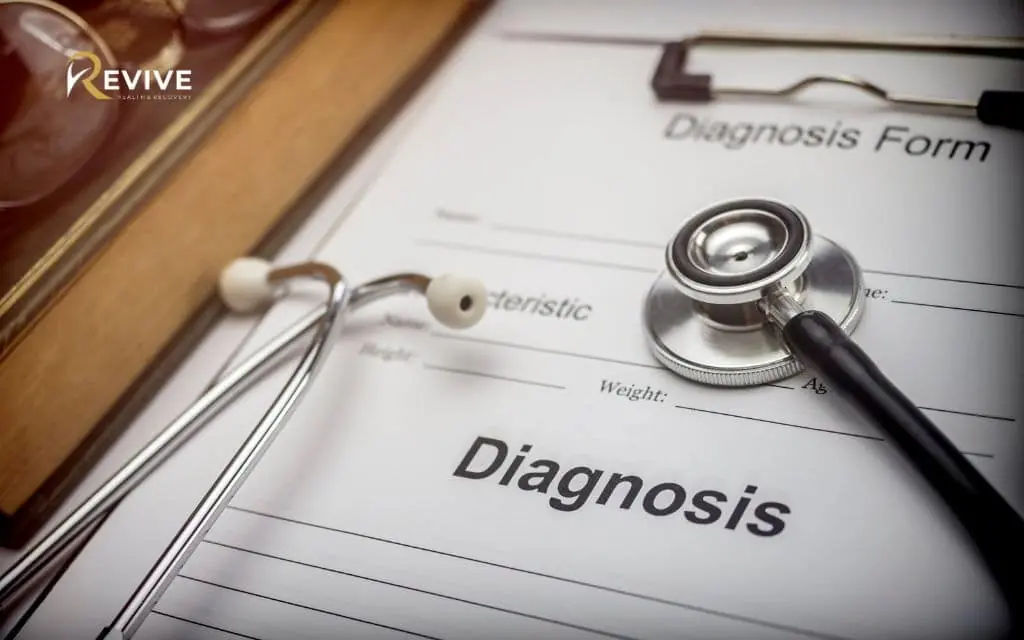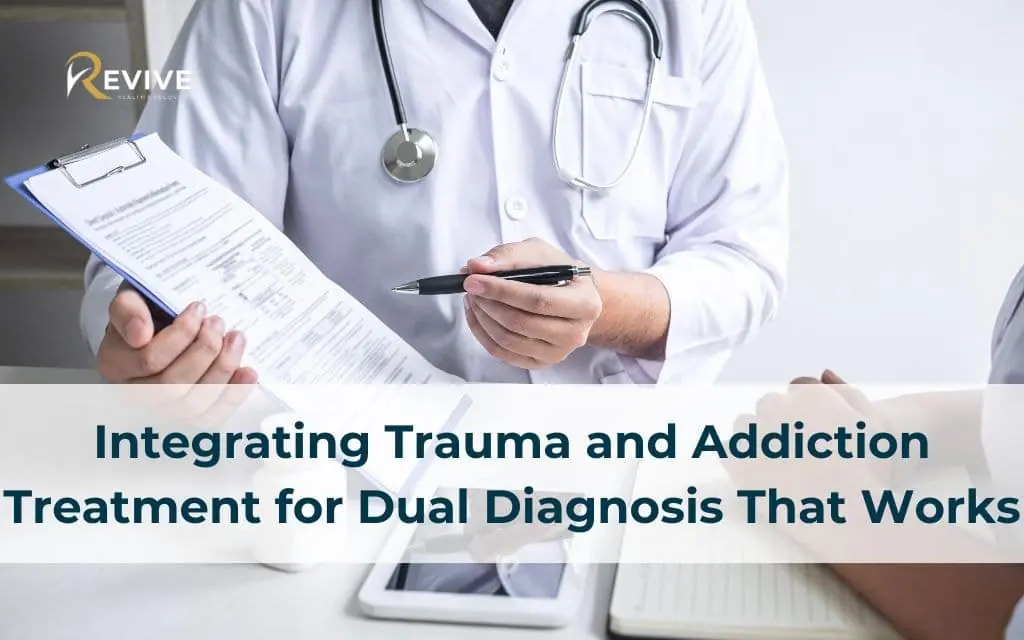Integrating trauma and addiction treatment represents a vital advancement in behavioral health care – addressing these interconnected conditions simultaneously rather than as separate issues. This approach has gained critical importance with research revealing that 95% of individuals with substance use disorders report trauma exposure.
In Denver, this connection is particularly significant, with local treatment facilities documenting high rates of trauma among their substance use population. The city has responded with specialized programs at centers like Revive Health Recovery address both conditions concurrently.
This comprehensive guide aims to educate healthcare professionals, administrators with Intergrated Wellness Tips, and individuals seeking treatment about the principles underlying integrated treatment, its evidence-based benefits, and the specific options available throughout Denver. Understanding these interconnected approaches offers hope for more effective, lasting recovery for those affected by both trauma and addiction.
Understanding Integrated Trauma and Addiction Treatment
The connection between trauma and addiction represents one of the most significant challenges in behavioral health treatment. Research confirms that up to 95% of individuals with substance use disorders report experiencing trauma. This undeniable link demands an integrated approach to treatment – one that addresses both conditions simultaneously rather than as separate issues (integrating trauma and addiction treatment).
Integrated treatment for trauma and addiction recognizes that these conditions often function as two sides of the same coin. When individuals experience trauma, many turn to substances as a coping mechanism, creating a cycle that requires comprehensive intervention. This dual approach forms the foundation of effective recovery for many patients.
What is Integrated Treatment?
Integrated treatment addresses co-occurring disorders—specifically trauma disorders like PTSD alongside substance use disorders—within a unified treatment framework. Rather than treating these conditions separately, integrated programs recognize their interconnection and tackle them together.

At Revive Health Recovery in Denver, this integration manifests through customized treatment plans that address the full spectrum of a person’s needs. By working with both conditions simultaneously, patients receive more comprehensive care that acknowledges how these conditions influence each other.
The Trauma-Addiction Link
Trauma fundamentally alters brain chemistry and function, particularly in areas responsible for stress response and reward processing. These neurological changes increase vulnerability to addiction as individuals seek relief from distressing symptoms.
The National Institute on Drug Abuse (NIDA) confirms that adverse childhood experiences (ACEs) significantly predict later substance use disorders. Similarly, the Substance Abuse and Mental Health Services Administration (SAMHSA) reports that trauma exposure creates neurobiological changes that increase addiction susceptibility.
This understanding forms the basis of trauma-informed substance abuse treatment, which recognizes that addressing the trauma becomes essential for sustainable recovery from addiction.
Why Integrate Treatment?
Traditional approaches that address trauma and addiction separately often produce limited results. Patients may make progress in treating one condition only to experience setbacks when triggered by the untreated condition.
How does integrated treatment benefit patients? In several crucial ways:
- Improved treatment retention rates (up to 50% higher in some studies)
- Reduced substance use severity
- Decreased PTSD symptom intensity
- Lower relapse rates
- Enhanced overall quality of life
These improvements stem from addressing the root causes rather than just symptoms, creating a more sustainable foundation for recovery-oriented systems of care with integrating trauma and addiction treatment.
Principles of Trauma-Informed Care in Addiction Recovery
Trauma-informed care (TIC) represents a paradigm shift in treatment philosophy. Rather than asking “what’s wrong with you,” this approach asks “what happened to you,” acknowledging the profound impact of trauma on development and behavior.
Core TIC Principles
The Substance Abuse and Mental Health Services Administration (SAMHSA) identifies six core principles of trauma-informed care that guide effective integrated treatment:
- Safety (physical and emotional)
- Trustworthiness and transparency
- Peer support
- Collaboration and mutuality
- Empowerment and choice
- Cultural, historical, and gender considerations
These principles create environments where healing can occur without risk of re-traumatization. They ensure patients feel secure enough to address both trauma and addiction openly.
Implementing TIC
Implementing trauma-informed care requires transformation at multiple levels:
- Staff training in trauma recognition and response
- Physical environment modifications to enhance safety
- Policy changes that prioritize patient choice and collaboration
- Development of multidisciplinary teams
- Regular assessment of trauma-informed practices
At Revive Health Recovery, we implement these principles across all aspects of our program in integrating trauma and addiction treatment, ensuring that every interaction supports healing from both trauma and addiction.

Approaches to Integrated Treatment
Effective integrated treatment incorporates multiple evidence-based approaches tailored to individual needs. These modalities address both trauma processing and addiction recovery simultaneously.
Evidence-Based Therapies
Several therapeutic approaches have demonstrated effectiveness for co-occurring trauma and addiction:
Cognitive-Behavioral Therapy (CBT) helps patients identify connections between thoughts, feelings, and behaviors while developing healthier coping strategies.
Eye Movement Desensitization and Reprocessing (EMDR) enables patients to process traumatic memories without becoming overwhelmed, reducing their power to trigger substance use.
Seeking Safety, developed by Dr. Lisa M. Najavits, focuses on establishing safety and teaching coping skills without requiring trauma disclosure or processing. This model proves particularly effective for patients early in recovery.
Holistic and Culturally Tailored Methods
Comprehensive treatment extends beyond traditional therapy to include holistic approaches to addiction and trauma:
- Mindfulness practices that improve distress tolerance
- Movement therapies that address trauma stored in the body
- Expressive arts therapies that enable nonverbal processing
- Peer support groups that reduce isolation
- Nutritional support that addresses physical recovery needs
These approaches acknowledge that trauma and addiction affect the whole person and require whole-person healing.
Benefits of Integrated Treatment
Integrated treatment delivers measurable improvements across multiple dimensions of recovery.
Enhanced Recovery Outcomes
Patients receiving integrated trauma and addiction treatment demonstrate:
- 35-45% higher abstinence rates at 12 months
- Significant reductions in PTSD symptom severity
- Fewer hospitalizations and emergency services utilization
- Improved medication adherence
- Better engagement with aftercare services
Success stories of integrating trauma and addiction treatment consistently show that addressing trauma and addiction together creates more substantial and lasting improvement than addressing either condition alone.
Holistic Healing
Beyond symptom reduction, integrated treatment facilitates comprehensive healing:
- Improved relationships and social functioning
- Enhanced emotional regulation capabilities
- Development of healthy coping mechanisms
- Increased self-efficacy and empowerment
- Reduced shame and self-blame
- Greater overall life satisfaction
This holistic approach addresses the complete impact of trauma and addiction, not just their most visible manifestations.
Finding Integrated Treatment in Denver
Denver offers several options for integrated trauma and addiction treatment, though programs vary in approach, specialization, and services offered.
Top Denver Treatment Programs
When seeking to find integrated treatment program for trauma and addiction in Denver, consider these leading options:
Revive Health Recovery provides comprehensive integrating trauma and addiction treatment care with specialized trauma tracks, evidence-based therapies, and holistic support services in Denver. Their multidisciplinary team includes trauma specialists and addiction professionals working collaboratively.
Other notable programs include Denver CARES, offering acute stabilization and referral services, and Continuum Recovery Center, specializing in outpatient services. When exploring integrated treatment for trauma and addiction in Denver, it’s essential to evaluate each program’s specific approach.
Choosing the Right Program
When evaluating how to find a program that treats both trauma and addiction, consider these factors:
- Specialized training in trauma treatment
- Evidence-based integrated protocols
- Multidisciplinary treatment teams
- Comprehensive assessment processes
- Clear trauma-informed policies
- Appropriate level of care for your needs
- Cultural competence relevant to your background
The right program should address your specific trauma history while providing appropriate addiction treatment.
Cost and Insurance Options
The cost of integrated trauma and addiction treatment in Denver varies based on:
- Level of care (detox, residential, outpatient)
- Program duration
- Specific services included
- Insurance coverage
Many programs accept private insurance, Medicaid, and Medicare, though coverage varies by plan. Additionally, some offer sliding scale fees or payment plans to increase accessibility.
For specific cost information, contact programs directly and verify insurance coverage with your provider.
Success Stories from Denver
The effectiveness of integrating trauma and addiction treatment manifests in the transformed lives of Denver residents who have completed such programs.
Real-Life Transformations
“After years of using alcohol to numb my PTSD symptoms, I couldn’t imagine addressing both issues at once. The integrated approach at Revive Health Recovery helped me understand how my trauma fueled my drinking and gave me tools to heal both simultaneously. For the first time in decades, I feel whole.” – Michael, 45
“I tried traditional addiction treatment three times, but always relapsed when my trauma got triggered. Only when I found a program that treats both trauma and addiction did I finally break the cycle. Learning trauma responses weren’t my fault while taking responsibility for my recovery was transformative.” – Sarah, 32
These success stories of integrated treatment represent countless individuals who have found freedom through integrated care.
Resources for Professionals and Administrators
For professionals seeking to implement or improve integrated trauma and addiction services, several resources provide guidance and support.

Training and Education
Professional development opportunities include:
- SAMHSA’s TIC curriculum and implementation resources
- National Institute on Drug Abuse (NIDA) online learning platform for integrated treatment
- Colorado Office of Behavioral Health training programs
- Seeking Safety facilitator certification
- Denver-based trauma and addiction conferences
These resources help organizations transform their approach to treating co-occurring disorders.
Advocating for Change
Implementing integrated treatment requires:
- Organizational commitment to trauma-informed principles
- Policy development supporting integrated approaches
- Staff training in trauma-specific interventions
- Physical environment modifications
- Regular assessment of program effectiveness
- Continuous quality improvement processes
These steps create sustainable transformation in integrating trauma and addiction treatment delivery.
Frequently Asked Questions
What is integrated treatment for trauma and addiction? Integrated treatment addresses trauma and substance use disorders simultaneously within a coordinated treatment plan. At Revive Health Recovery, we use this approach to break the cycle where each condition perpetuates the other.
Why treat trauma and addiction together? Research shows that treating these conditions together improves outcomes for both. Addressing only one often leads to relapse or symptom reemergence. Revive Health Recovery’s integrated approach creates more sustainable recovery.
What are the benefits of integrated treatment? Benefits include higher recovery rates, reduced relapse, decreased trauma symptoms, improved quality of life, and better treatment retention. Revive Health Recovery patients consistently report greater satisfaction with integrated care versus previous single-focus treatments.
How can I find integrated treatment programs in Denver? Start by contacting Revive Health Recovery for a comprehensive assessment and treatment options. We provide Denver’s most complete integrated trauma and addiction services with multiple levels of care.
What are the costs and insurance options for integrated treatment in Denver? Costs vary based on program intensity and duration. Revive Health Recovery works with most major insurance providers and offers financial counseling to explore all payment options, making quality care accessible.
What is trauma-informed care and why does it matter in addiction recovery? Trauma-informed care recognizes the prevalence and impact of trauma on recovery. Revive Health Recovery incorporates this approach throughout our programming, creating safety and empowerment crucial for healing both conditions.
Are there holistic programs in Denver using mindfulness or yoga? Yes, Revive Health Recovery integrates evidence-based mindfulness, yoga, and other holistic approaches to addiction and trauma within our comprehensive treatment programs, addressing mind, body, and spirit in recovery.
Conclusion
Integrating trauma and addiction treatment represents the most effective approach for addressing these interconnected conditions. For Denver residents struggling with co-occurring disorders, comprehensive integrated treatment offers the best path to sustainable recovery.
By addressing the root causes of addiction through trauma-informed substance abuse treatment while simultaneously providing evidence-based dual diagnosis treatment options, programs like Revive Health Recovery create foundations for lasting healing. The transformation possible through this approach extends beyond symptom reduction to true quality of life improvement.
If you or someone you know struggles with trauma and addiction, contact Revive Health Recovery today to learn about our integrated treatment options. Our team stands ready to support your journey toward comprehensive healing and recovery.



